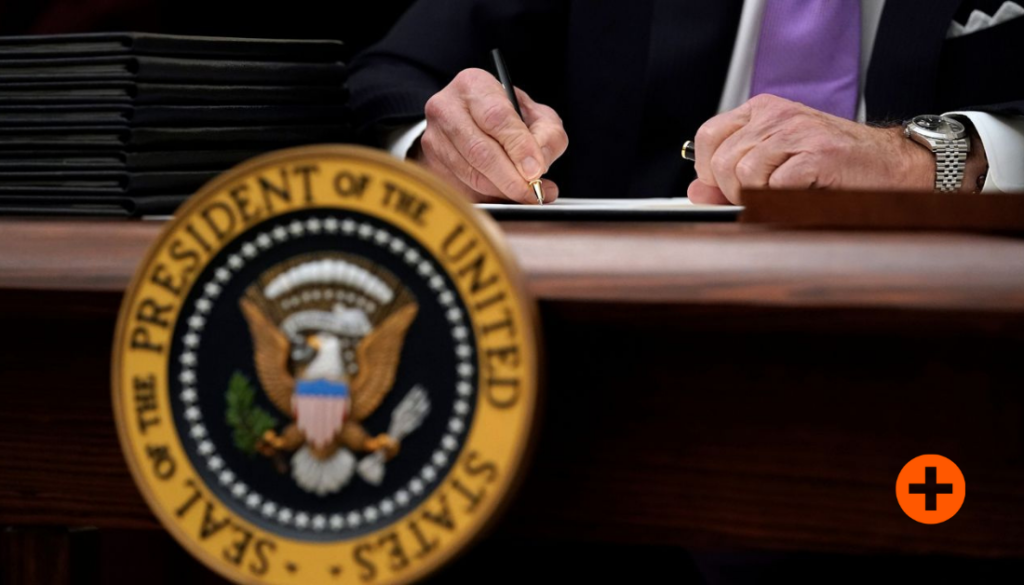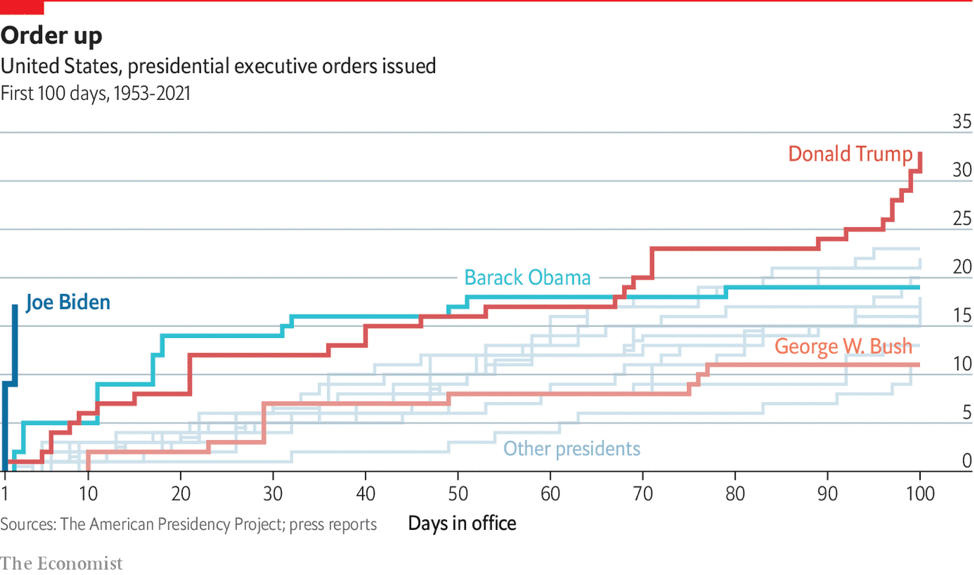
Published on January 28, 2021 / Leer en español
Dear Readers:
The new year has begun with an insurrection, an inauguration, and an impeachment. And while there are some signs of a return to normality in Washington, D.C. (for example, press briefings that are actually informative) it is too early to say all is quiet on the northern front. The impeachment trial of President Trump in the Senate will certainly roil the political waters. Not to mention the Democrats’ willingness to jam through Congress a $1.9 trillion relief package using a procedural maneuver to circumvent a Republican filibuster.
Indeed, the threat by the Democrats to eliminate the filibuster may prove to be the most controversial issue during the first 100 days of the Biden administration. There is no doubt the cloture rule is undemocratic and unduly benefits Senators from mostly rural states with small populations at the expense of the urban majority and should therefore be eliminated. In practice, however, that is highly unlikely. First, because President Biden is a Senate institutionalist, having spent 36 years as a U.S. Senator. Second, because the Republicans will never vote for its elimination, while Democrats are divided about the issue and at least two Democratic Senators from Republican-leaning states have already said they will vote against the proposal (Manchin-WV and Sinema-AZ). This does not mean the issue is off the table. The Democratic majority in the Senate will face pressure from its left flank for doing away with the filibuster if Republicans decide to dig in and shoot down every significant policy effort from the Democratic side.
The challenge, then, for both Democrats and Republicans is how to implement a bold 21st-century agenda using 18th-century political tools.
—Sergio M. Marxuach, Editor-in-Chief
Insights + Analysis from CNE

Image Credit – AP Photo: Alex Brandon
President Biden’s First 100 Days
By Sergio M. Marxuach, Policy Director
The Biden administration has hit the ground running in a way not seen in Washington in decades. The president has signed dozens of executive orders and signaled he will be sending major legislation to Congress soon. Among the issues the president wants to tackle during his first 100 days we find the following:
- Pandemic Response and Economic Relief – The president has unveiled a $1.9 trillion package to bolster the federal response to the pandemic, help state and local governments, and provide economic assistance to millions of unemployed workers and business owners. Some Republicans have balked at the price tag, but the administration is doing the right thing in presenting a comprehensive package at this time. Otherwise, we run the risk of permanent economic scarring as the pandemic slowly fades away.
- Infrastructure – Economic aides have also stated the administration will be unveiling next month a larger economic recovery package focused on infrastructure spending. Traditional infrastructure, that is roads, bridges, airports, etc., is in pretty bad shape across the United States. Significant investment in infrastructure by the federal government would address long-standing needs and provide much-needed economic stimulus across the country.
- Climate Change – In addition to the executive orders he has already signed to rejoin the Paris Climate Agreement and stop the Keystone pipeline, the president plans to unveil, probably as part of the larger infrastructure package, federal investments in green technology, covering research and development, manufacturing, and the deployment of new energy technologies.
- Health Care – President’s Biden health care proposals are based on expanding the scope and reach of the Affordable Care Act. His health care advisors are looking at expanding access to insurance marketplaces; creating a new public insurance alternative alongside private health plans; and lowering the age at which people typically become eligible for Medicare, the federal insurance program for older Americans, from 65 to 60.
- Immigration – The president has already signed executive orders reversing the ban on travelers from certain Muslim countries; stopping the construction of the border wall with Mexico; and ordering U.S. immigration agencies to set strict guidelines for arresting and deporting immigrants. In addition, the administration plans to send to Congress a comprehensive immigration reform bill, providing for, among things, a path to citizenship for nearly 11 million undocumented migrants, after a period of eight years and the payment of certain fines.

The U.S.’ Transatlantic Challenge
By Jennifer Wolff, Ph.D. – Director, Madrid Policy Bureau
President Biden’s ambitious domestic agenda – in which Puerto Rico aspires to introduce itself – will compete in attention and resources with the administration’s need to repair the fractures inherited from the Trump administration on the international front. There is relief in Europe – the European Parliament has said that Biden’s election represents “a new dawn for transatlantic ties” – but the return of the U.S. to the international community will face a myriad of challenges, even with its traditional allies, the Europeans.
As German Chancellor Angela Merkel – a formidable figure – recently said in Berlin: “don’t think that from tomorrow there will only be harmony between us. There will also be arguments about how best to do things for our two countries”. Words of caution, considering that the U.S. and the European Union (EU) have the largest bilateral economic relationship in the world. According to the Congressional Research Service, Europe is the U.S.’ most important trading partner, with an exchange of products and services valued at $1.3 trillion each year.
The U.S.’ image has been tarnished in Europe. The prestigious Council on Foreign Relations (ECFR), a strategic studies European think tank, published in January 2021 the results of a survey it conducted in 11 countries of the EU. Although most of those surveyed expressed joy at Biden’s election, many expressed mistrust towards “America” and its future: one out of every three respondents (32%) think that voters in the U.S. could again elect to the Presidency someone like Trump; and more than half (51%) think that the U.S.’ electoral system “is broken” and does not work well. This makes the U.S. a potentially unstable partner. The International Monetary Fund recently developed an index to measure global uncertainty and found that in the past decades the U.S. – its international interventions, its monetary policies, and its electoral events – has been one of the global economy’s main sources of uncertainty.
Data Snapshot
Storm of Executive Orders

According to The Economist, President Biden has been issuing executive orders “at a blistering pace. Within hours of being sworn in, he had recommitted America to the Paris climate accord; restored ties with the World Health Organisation; lifted a ban on travellers to America from several Muslim-majority countries; promised to protect from deportation “dreamers”, brought to America illegally as children; extended temporary freezes on household evictions and federal student-loan payments; mandated mask-wearing in airports, public transport and in federal buildings; and halted construction of the US-Mexico border wall.”
On Our Radar...
![]() Buy American – The Hill reports that President Biden signed “an executive order aimed at strengthening ‘Buy American’ rules with the goal of increasing the federal government’s procurement of American-made goods.” Among other things, the order “aims to increase domestic content requirements and close current loopholes. And it would direct federal agencies to use the manufacturing extension partnership, a network of small and medium-sized businesses across 50 states and Puerto Rico, to ensure that agencies are connecting with new domestic suppliers.”
Buy American – The Hill reports that President Biden signed “an executive order aimed at strengthening ‘Buy American’ rules with the goal of increasing the federal government’s procurement of American-made goods.” Among other things, the order “aims to increase domestic content requirements and close current loopholes. And it would direct federal agencies to use the manufacturing extension partnership, a network of small and medium-sized businesses across 50 states and Puerto Rico, to ensure that agencies are connecting with new domestic suppliers.”
![]() Accountability – “Much has been made of the word unity in the past year. After the Capitol attack on January 6, many Republican legislators called for unity, responding to the righteous ire from their fellow lawmakers who demanded investigations, arrests, and impeachment. The unity theme was also a main pillar of the Biden-Harris campaign, messaging intended to implore the nation to fight for a new future. Unity, for some, is pure sentiment. A quick, uncomplicated cure-all that is achieved merely by being summoned. For others, however, unity calls for hard work and accountability, or it risks granting unearned forgiveness for harmful transgressions, papering over deep injustices”… writes Syreeta McFadden in The Atlantic.
Accountability – “Much has been made of the word unity in the past year. After the Capitol attack on January 6, many Republican legislators called for unity, responding to the righteous ire from their fellow lawmakers who demanded investigations, arrests, and impeachment. The unity theme was also a main pillar of the Biden-Harris campaign, messaging intended to implore the nation to fight for a new future. Unity, for some, is pure sentiment. A quick, uncomplicated cure-all that is achieved merely by being summoned. For others, however, unity calls for hard work and accountability, or it risks granting unearned forgiveness for harmful transgressions, papering over deep injustices”… writes Syreeta McFadden in The Atlantic.
![]() State and City Budgets – “The coronavirus pandemic is placing enormous budget pressure on state and local governments, threatening deep and potentially lasting cuts to education, infrastructure, and other important investments.” Forcing state and local governments to balance their budgets in the middle of a pandemic will only put a drag on the economic recovery. That is why federal help is needed, argue Anshu Siripurapu and Jonathan Masters in this Backgrounder published by the Council on Foreign Relations.
State and City Budgets – “The coronavirus pandemic is placing enormous budget pressure on state and local governments, threatening deep and potentially lasting cuts to education, infrastructure, and other important investments.” Forcing state and local governments to balance their budgets in the middle of a pandemic will only put a drag on the economic recovery. That is why federal help is needed, argue Anshu Siripurapu and Jonathan Masters in this Backgrounder published by the Council on Foreign Relations.
